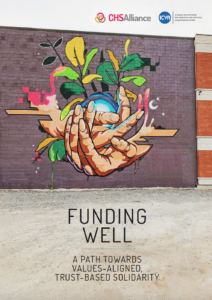New report into how donors can “Fund Well”
I like to think I have a unique perspective when it comes to humanitarian financing.
For one thing – I spent ten years working for a humanitarian donor, and then another ten years working for coalitions of humanitarian NGOs (a.k.a. implementers).
When I made my career pivot – moving from funding to implementation – I was stunned when some of the same people who used to return my calls and laugh at my jokes and take me out to lunch ignored my requests and shouted at me (more than once) for daring to speak up about problems faced by their own NGO partners.
It was a humbling status reversal that I’ll never forget. It was a pointed example of one of the many ways power and privilege show up in the humanitarian system.
And it got me curious: where can we find partnerships between funders and implementers that explicitly take this power dynamic into account?
This formed the basis of the new CHS Alliance and ICVA report into “Funding Well”.
My co-author Rachel Jacquot and I scoured the humanitarian and other sectors for examples of “Funding Well”. What we found gives me hope.
For example:
- Co-Impact focuses on supporting women-led, locally rooted, values-aligned partner organisations rather than projects
- the Community-Led Innovation Partnership (CLIP) defers to people with lived experience through user-centred programme design
- Urgent Action Fund for Women’s Rights Asia & Pacific encourages and resources partners to access staff care
- donors in the Funder Safeguarding Collaborative are expected to “walk the talk” by implementing their own safeguarding policies, and
- the Dutch Relief Alliance expects its partners to meet the Core Humanitarian Standard as part of doing business.
To see these Funding Well practices spread we don’t need to reinvent the wheel. We just need to shine a light on what is working and offer a path forward. To that end, the report suggests a 4-part, long-term change process that will get us closer, collectively, towards values-aligned, trust-based solidarity in the humanitarian sector.
I’m happy to report that one of the interlocutors who shouted at me is now a friend. In fact, they recently invited me to lunch. It took a lot of work to improve our relationship, but it was worth it.
If this resonates with you and sounds like something you would like to be a part of download the full report.
Funding Well is the latest in a series of our reports into how the aid system can create kinder, more accountable organisations. Read the others: “Working Well“, “Leading Well“ & “Governing Well“.

